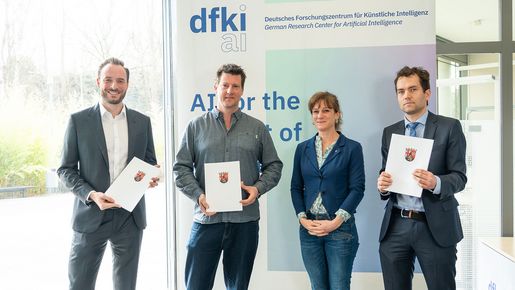
AI-supported personalized medicine: AI4Nof1 research project combines clinical research with individual patient care
| Health & Medicine | Data Management & Analysis | Machine Learning & Deep Learning | Data Science and its Applications | Smart Data & Knowledge Services | Kaiserslautern | Press release

Challenge: bridging research and practice
Randomized controlled trials (RCTs) are considered the gold standard of evidence-based medicine. However, their results are usually based on large patient groups and cannot always be directly applied to individual patients or specific cases. In clinical practice, doctors therefore often have to resort to time-consuming, repeated trial and error to find a suitable treatment for each patient. At the same time, valuable insights from routine care remain untapped because they are not systematically linked to research. This is precisely where AI4Nof1 comes in.
AI-supported solution for individualized treatment
For example, machine learning methods (reinforcement learning) will be used to conduct adaptive “N-of-1” studies in which individual treatment courses are analyzed and optimized. Instead of analyzing the effectiveness of a treatment for a large group, the approach is to examine which intervention works best for an individual person. An intelligent computer model learns from the patients' experiences and improves its therapy recommendations over time. At the same time, the insights gained are anonymized and can be incorporated into general research to improve future treatments.
An important step for personalized medicine
Project manager Prof. Dr. Sebastian Vollmer, head of the DFKI research department Data Science and its Applications: ”AI4Nof1 is making an important contribution to improving healthcare. The combination of AI-supported analysis and patient-centered data collection promises more efficient and individualized treatment for people with chronic illnesses. The project shows how state-of-the-art AI technologies can revolutionize medicine and at the same time facilitate access to customized care for patients.”
“With the 'AI4No1' project, we are taking an important step towards individualized medicine. The researchers are investigating how artificial intelligence can help to develop personalized treatments for irritable bowel syndrome – a condition that affects many people, but whose therapeutic approaches have so far often lacked the necessary degree of individuality. This interdisciplinary partnership combines excellent science with concrete medical benefits – an important goal of our research funding,” said Katharina Heil at the presentation of the state grant. With this project, Rhineland-Palatinate is once again living up to its role as a center of innovation and making a valuable contribution to the future of medicine.
Prof. Dr. Andreas Dengel, Managing Director of DFKI in Kaiserslautern: “Artificial intelligence offers enormous opportunities for medicine overall, by improving diagnoses, personalizing treatments and optimizing processes. The approach of AI4Nof1 aims to play a central role in individual patient care in particular, by bridging the gap between population-based research and personalized therapies. The integration of AI into medical care thus promises not only an improvement in individual treatment outcomes, but also added value for society by systematically making insights from clinical routine usable for patients."
Competence Network for AI in Medicine
Involved in AI4Nof1 are the German Research Center for Artificial Intelligence (DFKI) as project leader, the Technical University of Rhineland-Palatinate Kaiserslautern-Landau (RPTU), the Max Planck Institute for Software Systems (MPI-SWS), all in Kaiserslautern, and the University Medical Center Mainz (UM). This will create a collaborative structure in Rhineland-Palatinate that will be expanded to include further hospitals and that will serve as a transnational center of competence and excellence for the development of AI algorithms for medicine and healthcare in general in the medium term.
About the AI4Nof1 project
AI4Nof1 is an interdisciplinary research project that combines state-of-the-art AI technologies with medical expertise. The aim is to link the findings from population-based studies with the individual needs of patients and to enable personalized care through adaptive digital interventions. Particularly in the area of irritable bowel syndrome, gaps in existing medical guidelines are to be closed by researching specific recommendations for individual lifestyle changes.
Further Information
Press release from the Rhineland-Palatinate Ministry of Science and Health
Contact:
Prof. Dr. Sebastian Vollmer
Head of Research Department Data Science and its Applications
- Sebastian.Vollmer@dfki.de
- Phone: +49 631 20575 7601
Press contact:
Christian Heyer
Head of Communications & Media KL | DA
- Christian.Heyer@dfki.de
- Phone: +49 631 20575 1710
